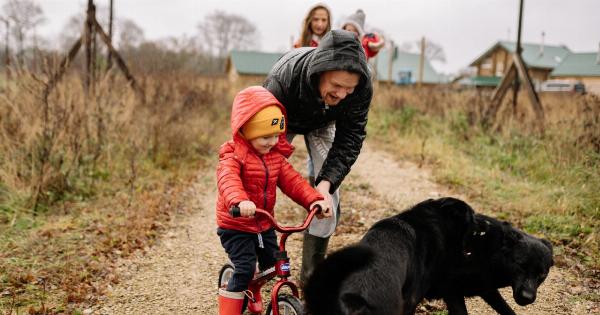Owning a dog can bring immense joy and companionship to your life, but just like us humans, dogs can have their fair share of difficult days.
Sometimes our furry friends may experience physical discomfort, anxiety, or behavioral issues that can cause them to act out or withdraw. As responsible pet owners, it’s crucial for us to understand how to handle these situations and support our dogs during their challenging times.
In this ultimate guide, we will explore various strategies and techniques to help you navigate through your dog’s difficult days with patience, understanding, and love.
1. Recognizing the Signs of a Difficult Day
Dogs communicate through body language and behavioral cues, so it’s essential to pay close attention to their actions and reactions. Some signs that your dog may be having a difficult day include:.
- Excessive panting
- Decreased appetite
- Restlessness
- Aggression or irritability
- Excessive scratching, licking, or chewing
- Withdrawal or hiding
- Excessive barking or howling
- Intense pacing or inability to settle
- Loss of interest in toys or activities
- Changes in bathroom habits
2. Assessing the Cause
Once you’ve identified that your dog is having a difficult day, the next step is to determine the underlying cause. There can be various reasons for your dog’s distress, and here are a few common ones:.
- Physical discomfort or pain
- Anxiety or fear
- Allergies or skin irritations
- Separation anxiety
- Boredom or lack of mental stimulation
- Changes in their environment
- Previous traumatic experiences
3. Consult with a Veterinarian
If you notice persistent or severe signs of distress in your dog, it’s crucial to consult with a veterinarian.
They can perform a thorough examination to rule out any underlying health conditions that may be contributing to your dog’s difficult days. Your vet may also recommend appropriate medication or therapies to alleviate your dog’s discomfort or anxiety.
4. Provide a Calm and Safe Environment
Creating a calm and safe environment is essential to help your dog cope with their difficult days. Here are some ways to achieve this:.
- Designate a quiet space where your dog can retreat to when feeling overwhelmed
- Use calming tools like pheromone diffusers or music specifically designed for dogs
- Ensure your dog has a comfortable and cozy bed to relax in
- Minimize exposure to loud noises or chaotic environments
- Establish a routine to provide a sense of stability for your dog
5. Addressing Behavioral Issues
If your dog’s difficult days are accompanied by behavioral issues, it’s important to address them with positive reinforcement and training techniques. Here’s what you can do:.
- Enroll your dog in obedience classes or hire a professional dog trainer
- Use positive reinforcement techniques, such as rewards and treats, to encourage desired behaviors
- Avoid punishment-based training methods that can increase anxiety or fear
- Provide mental stimulation through interactive toys or puzzles to combat boredom
- Establish clear boundaries and consistent rules for your dog
6. Ensuring Physical Comfort
A physically comfortable dog is more likely to have a better overall disposition. Consider the following tips to ensure your dog’s physical comfort:.
- Provide a well-balanced diet and fresh water
- Give regular exercise and playtime to release pent-up energy
- Regularly groom your dog to prevent skin irritations or matting
- Ensure your dog has a comfortable and orthopedically supportive bed
- Use appropriate pain management techniques if your dog has a chronic condition
7. Incorporating Mental Stimulation
Dogs need mental stimulation to keep their minds sharp and engaged. Here are a few ways to provide mental stimulation for your dog:.
- Introduce puzzle toys or treat-dispensing toys that require problem-solving
- Engage in interactive play sessions with your dog
- Teach new tricks or commands to keep their brains active
- Rotate and introduce new toys regularly to prevent boredom
- Consider enrolling your dog in activities like agility or scent training
8. Implementing Relaxation Techniques
Helping your dog relax is crucial during difficult times. Consider the following relaxation techniques:.
- Practice deep breathing exercises and encourage your dog to join by your side
- Play soothing and calming music
- Try massage techniques designed for dogs
- Use aromatherapy with dog-safe essential oils like lavender or chamomile
- Provide a safe and comfortable space for your dog to rest
9. Seek Professional Help
If you’re finding it challenging to manage your dog’s difficult days or if their behavior continues to escalate, do not hesitate to seek professional help.
There are certified dog behaviorists and trainers who specialize in dealing with complex canine issues. They can provide personalized guidance and training plans to help your dog navigate through their challenges successfully.
10. Shower Your Dog with Love and Understanding
During your dog’s difficult days, it is important to remember that they need your love and understanding more than ever. Be patient, empathetic, and shower them with affection. Sometimes, all your dog needs is to know that you are there for them.

























